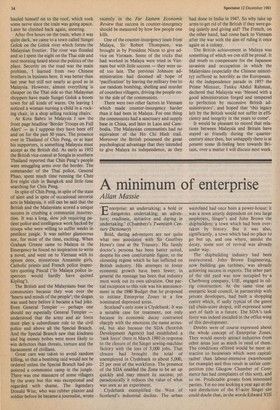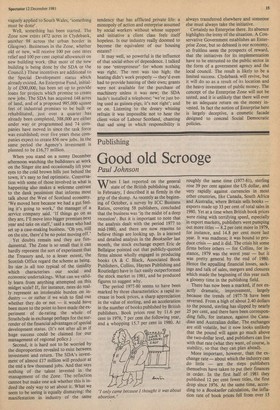A minimum of enterprise
Allan Massie
'Enterprise: an undertaking; a bold or dangerous undertaking; an adventure; readiness, initiative and daring in undertaking.' (Chambers's Twentieth Century Dictionary) Bold, daring adventures are not quite what one associates with Sir Geoffrey Howe's time at the Treasury. His family doctor's persona has been better suited, despite his own comfortable figure, to the slimming regime which he has inflicted on British industry. His attempts to foster economic growth have been fewer; in general the message has been that industry must work out its own salvation. One partial exception to this rule was his announcement in the 1980 Budget that he proposed to initiate Enterprise Zones in a few nominated depressed areas.
Scotland's only zone is Clydebank. It was a suitable case for treatment, not only because its economic decay contrasted sharply with the emotions the name aroused, but also because the SDA (Scottish Development Agency) had established a 'task force' there in March 1980 in response to the closure of the Singer sewing-machine factory with the loss of 3,000 jobs. That closure had brought the total of unemployed in Clydebank to about 5,000, 25 per cent of the workforce. The presence of the SDA enabled the Zone to be set up quickly and may ensure its success; yet paradoxically it reduces the value of what was seen as an experiment.
Clydebank exemplified the West of Scotland's industrial decline. The urban wasteland had once been a power-house; it was a town utterly dependent on two large employers, Singer's and John Brown the shipbuilders; a town which had been overtaken by history. But it was also, significantly, a town which had no place to go but up, and one where, amidst the decay, some sort of revival was already under way.
The shipbuilding industry had been restructured. John Brown Engineering, now building gas turbines, was already achieving success in exports. The other part of the old yard was now occupied by a Cherbourg company, WE, engaged in oilrig construction. At the same time an energetic local council, in partnership with private developers, had built a shopping centre which, if sadly typical of the genre (all chain-store shops), still expressed some sort of faith in a future. The SDA's task force was indeed installed in the office wing of this development.
Doubts were of course expressed about the whole concept of Enterprise Zones. They would merely attract industries from other areas just as much in need of them. The conditions offered would be most attractive to businesses which were capitalrather than labour-intensive (warehouses for example) and thus result in unfair competition (the Glasgow Chamber of Commerce has had complaints of this sort), and so on. Predictable groans from interested parties. Yet no one looking a year ago at the vast dereliction of the 87-acre Singer site could doubt that, in the words Edward VIII vaguely applied to South Wales, 'something must be done'.
Well, something has been started. The Zone now exists (472 acres in Clydebank, another 98 across the urban border in Glasgow). Businesses in the Zone, whether old or new, will receive 100 per cent rates relief and 100 per cent capital allowances on new building work. (But most of the new building is being done by the SDA or the Council.) These incentives are additional to the Special Development status which already existed. An Enterprise Fund, initially of £500,000, has been set up to provide loans for projects which promise to create new jobs. The SDA has acquired 148 acres of land, and of a proposed 995,000 square feet of industrial premises to be built or rehabilitated, just over a quarter has already been completed, 388,000 are either under way or programmed and 74 com panies have moved in since the task force was established; over five years these companies expect to create 856 new jobs. In the same period the Agency's investment is planned to be £16,77 million.
When you stand on a sunny December afternoon watching the bulldozers at work on the Singer site and occasionally lift your eyes to the cold brown hills just behind the town, it's easy to feel optimistic. Conversation with some of those involved in what is happening also makes a welcome contrast to the dank pessimism that informs most talk about the West of Scotland economy. 'We moved here because we had a gut feeling it's going to work,' the manager of a service company said. `If things go on as they are, I'll move into bigger premises next year and take on staff,' said a man who had set up a case-making business. 'Oh yes, still on the site, there'd be no point moving off.'
Yet doubts remain and they are fundamental. The Zone is so small that it can hardly represent the sort of experiment that the Treasury and, to a lesser extent, the Scottish Office regard the scheme as being. Its size is all too typical of the timidity which characterises our social and economic undertakings. What can we validly learn from anything attempted on this midget scale? If, for instance, rates do really represent an intolerable burden on industry — or rather if we wish to find out whether they do or not — it would have been more to the point to have made the experiment of de-rating the whole of Strathclyde in exchange perhaps for the surrender of the financial advantages of special development status. (It's not after all as if huge success could be claimed for our management of regional policy.) Second, it is hard not to be worried by the disproportion revealed to exist between investment and return. The SDA's investment of almost £17 million will produce at the end a few thousand jobs. And that says nothing of the talent invested in the management of the Zone. The reflection cannot but make one ask whether this is indeed the only way to set about it. What we seem to be seeing is equally dismaying: the manifestation in industry of the same tendency that has afflicted _private life: a monopoly of action and enterprise assumed by social workers without whose support and initiative a client class feels itself hopeless. Is our industry really doomed to become the equivalent of our housing estates?
It may well, so powerful is the influence of that social ethos of dependence. I talked to one 'entrepreneur' for whom nothing was right. The rent was too high; the heating didn't work properly — they'd even had to provide heating of their own; grants were not available for the purchase of machinery unless it was new; the SDA hadn't installed a telephone; 'we're just being used as guinea-pigs, it's not right'; and so on. Listening to the dreary whining refrain it was impossible not to hear the client voice of Labour Scotland, chanting that sad song in which responsibility is always transferred elsewhere and someone else must always take the initiative.
Certainly no Enterprise there. Its absence highlights the irony of the situation. A Conservative Government establishes an Enterprise Zone, but so debased is our economy, so fruitless seem the prospects of reward, that the initiatives for its implementation have to be entrusted to the public sector in the form of a government agency and the local council. The result is likely to be a limited success. Clydebank will revive, but it will do so as a result of its location and the heavy investment of public money. The concept of the Enterprise Zone will not be tested, and it is unlikely that there will ever be an adequate return on the money invested. In fact the notion of Enterprise here is largely deceptive, a cosmetic facade designed to conceal Social Democratic policies.







































 Previous page
Previous page